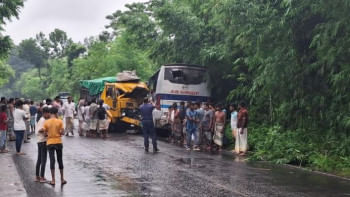Let's get our 'alt-facts' straight

They say we live in a post-truth era where the facts don't matter. The belief that you already have in your mind is so strong that it, more often than not, overpowers the truth and dominates the part of your brain that helps you create an opinion on a particular issue.
So strong are such opinions that when you go on to try and change them, you end up becoming someone from the 'other side' or someone who has a particular agenda. A glance at the recent elections in the United States of America perhaps provides the best example of the above statement.
America arguably has the highest number of fact-checking organisations in the world. Many of these organisations, which include media agencies and independent watchdogs are considered to be the best. And yet, they weren't able to change the people's mindset as far as their new president is concerned.
Donald Trump had switched facts, or used 'alternative facts' as members of his party would say, in so many of his speeches leading up to the elections that Politifact, one of the leading faces of the fact-checking industry, actually had to create a separate section for him on their website. They termed it the 'Trump-o-meter.'
The Politifact uses a 'Truth-o-meter' that has variables ranging from 'Mostly True' to 'Pants on Fire' with the latter rating being the worst. On a similar note, the Washington Post's fact-checker uses pictures of Pinocchio as a visual metaphor to describe how fabricated a particular statement or a specific article is, with four Pinocchios being the worst rating.
A large number of Trump's statements prior to the elections was rated as 'Pants on Fire' and given four Pinocchios. The fact-checking department at CNN went up a notch when it quoted Trump on one of its graphical headlines and then refuted him in brackets.
With the digital era expanding and more on more media organisations depending primarily on the social media for news, fact-checking organisations have become all the more important in today's era and it therefore is not a surprise that many independent fact-checking organisations have come to light in recent times.
The urgency with which one has to deliver news these days is another reason why certain media organisations have actually begun paying independent fact-checkers to confirm the validity of a news. This new trend is actually quite interesting. There are, in today's world, news agencies which pay other news-based fact-checking organisations for valid reports and then in turn distribute them to its own subscribers.
The importance of fact-checking can perhaps best be judged by a reporter on the ground. As a sports reporter who covers cricket in Bangladesh, I can recall a number of occasions where reporters from newspapers got it hilariously wrong.
One of the reasons behind that, as expected, is the inability to recheck information; the other of course, is that reporters in the sports arena, at times, tend to kill their boredom by spreading rumours in the arena, which they don't necessarily expect to get published. Unfortunately, some of them do.
During one such adda between reporters at the Sher-e-Bangla National Cricket Stadium, an individual suddenly decided to call Bangladesh's first bilateral tour of India as the 'Durjoy-Ganguly Trophy' – Durjoy representing Naimur Rahman, Bangladesh's first Test captain, and Sourav Ganguly, one of the greatest cricketers produced from West Bengal.
The discussion was gaining momentum but it ended as soon as the adda came to an end. To everyone's surprise though, one particular daily, which has a huge circulation and the representative of which wasn't even present at the adda, couldn't stop itself from publishing a small story on this issue.
The Bangladesh Cricket Board had never even talked about this agenda and neither did any of stakeholders of the BCB. And yet, there it was, the news was published.
The online websites eventually joined the bandwagon. What was even more interesting to see was that this was actually put-forth as a question on Sourav Ganguly's Reality Television show 'Dadagiri' on Zee News. A contestant was actually asked the question: “What will be the upcoming series between India and Bangladesh be called?” Ganguly obviously didn't think it was necessary to recheck his facts because the show flashed the wrong answer—Durjoy and Ganguly Trophy.
If a small piece of news from a daily adda can go on to hit the screens of one of the most-watched programmes in both the Bengals, you never know what can happen if you don't have gatekeepers who are able to tackle with the fast-paced journalism of this era.
The writer is a journalist who tweets @naimonthefield

 For all latest news, follow The Daily Star's Google News channel.
For all latest news, follow The Daily Star's Google News channel. 



Comments